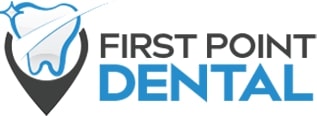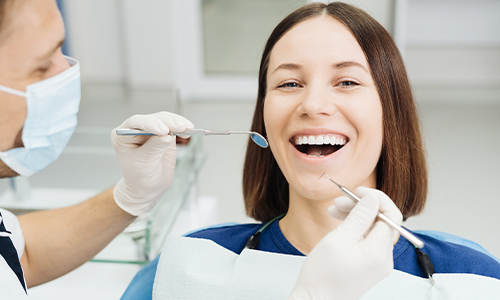Dental Hygiene Tips for a Healthy Smile
Healthy teeth and gums are a big factor when it comes to your overall well-being, and not taking proper care of the latter can increase your chance of developing conditions such as heart disease, respiratory problems, and dementia. Most dental experts agree that tooth decay and gum disease can be warded off by good dental hygiene. Daily brushing and flossing of teeth are chief dental practices to maintain good oral hygiene. However, best dental hygiene does not stop at simply following a dental care regimen. Regularly visiting a dentist for check-ups is also a key part of your dental health, but the best approach to maintaining oral health year-round is to have a solid-at-home routine. Keep reading to learn about some simple dental hygiene tips and tricks recommended by the dental experts in Chicago at First Point Dental for maintaining and achieving better oral health.
Top 10 Dental Care Tips and Tricks
1. Do this Daily – Brush your Teeth Twice a Day for 2 Minutes at a Time
This helps you properly clean the surfaces of your teeth, and it removes food debris upon which mouth bacteria feed, keeping dental plaque at bay. Dental plaque is a bacterial film that can release acids that erode enamel and affect gum health. For kids who recently had their adult teeth come in, parents must introduce this 2×2 rule and find ways to make this practice a fun activity.
2. Learn the Proper Brushing Technique
Brushing your teeth too vigorously can increase the chances of receding gums and erosion of enamel. Hence, you must learn and understand the right way to brush your teeth. Dentists recommend brushing your teeth in the following way-
- Grasp your toothbrush at a 45-degree angle with your gums.
- Move your hand holding the toothbrush slowly in a circular motion making small circles.
- While brushing cover all the inner, outer, and chewing surfaces of your teeth.
- Wait some time before rinsing your mouth.
- Spend 30 seconds on each quadrant of teeth (i.e. complete 2 minutes)
After brushing, don’t forget to brush your tongue gently with the same toothbrush or a tongue scraper. This eliminates the bacteria from food particles and avoids bad breath.
3. Regularly Change Your Toothbrush and Replace It if There Are Signs of Wear
Frayed or damaged toothbrushes won’t keep your teeth clean and can cause gum damage. Therefore, it’s important to change it every 3-6 months. Remember to replace it if you are sick to avoid the re-introduction of bacteria inside the mouth. You may choose a manual toothbrush or switch to an electric toothbrush. In either case, it will help get rid of plaque build-up on teeth and along the gum line. Make sure the toothbrush has soft bristles, as they are both safe and comfortable to use in the mouth and cannot damage tooth enamel and gums. The head of the toothbrush must be small (usually half an inch or one inch tall for adults) so that it can easily clean all teeth. Do not brush too hard!
4. Keep Your Toothbrush Clean
After using a toothbrush, it must be rinsed with clean water, and the bristles must be stored in the open air for its effective and thorough drying. If this is not done, the bristles can become a breeding ground for mold, bacteria, and yeast.
5. Floss Once Every Day
Flossing before you brush at bedtime can help remove small food particles or other deposits that are missed by toothbrushes or remain lodged in between the teeth or gumline. Take two minutes daily to floss, without ignoring tight spaces to avoid plaque or tartar build-up leading to decay, cavities, or gum disease.
6. Increase Your Water Intake
Having more pure water can help flush away any food particles and plaque while fluorinated water can help strengthen the enamel. Drinking water is essential for people with dry mouth or regular snorers as low saliva production can create a perfect environment for bacteria build-up, mouth sores, tooth decay, and gum disease.
7. Use Dental Hygiene Products
These include fluoride mouthwash, interdental cleaners, oral irrigators, and tongue cleaners that must be used in adjunct with brushing and flossing to support good oral health.
8. Maintain a Healthy Diet
- Limit the intake of sugary, acidic, and starchy foods or drinks as plaque loves to feed on them
- Avoid late-night snacks
- Have food rich in calcium to strengthen tooth enamel
- Chew sugarless gums after meals to help fight cavities and freshen your breath
- Avoid chewing ice as it can damage tooth enamel
- Eat crunchy fruits and vegetables to stimulate saliva production which naturally defends against gum disease and cavities. These can neutralize the sugar content and help wipe away mouth bacteria that form plaque
9. Avoid Smoking
Excessive smoking or chewing of tobacco can make you more likely to develop oral and throat cancer. Moreover, after dental work, smoking can impair the natural healing ability of the body and delay healing.
10. Visit Dentist Twice a Year
Schedule dental check-ups every 6 months so that your dentist can prevent issues before they start or spot them early. Do not skip professional teeth cleanings biannually to remove plaque or tartar and help keep your gums and teeth healthy.
Daily brushing and flossing will help to keep dental calculus to a minimum, but going for a professional cleaning treatment provided by a dentist will remove calculus in places your toothbrush and floss have missed.
At First Point Dental, we are proud to offer quality dental care and advanced treatments that can help prevent cavities, infections, and gum disease. To schedule an appointment, call 888-736-6430 to learn more about dental care tips for healthy teeth from our dental experts.
Also Read About: Electric vs. Manual Toothbrushes

